Financial Review
Five-year summary
The five-year summary shows our continually strong financial position. In the five years from 2019, the business has delivered strong operating surpluses through the landlord business. Changes in turnovers between years primarily reflect first tranche and market sales activity that had been in our pipeline. We expect to see smoother growth in turnover as we deliver on our current development pipeline that provides a consistent number of new rented homes and those offering low-cost shared ownership options.
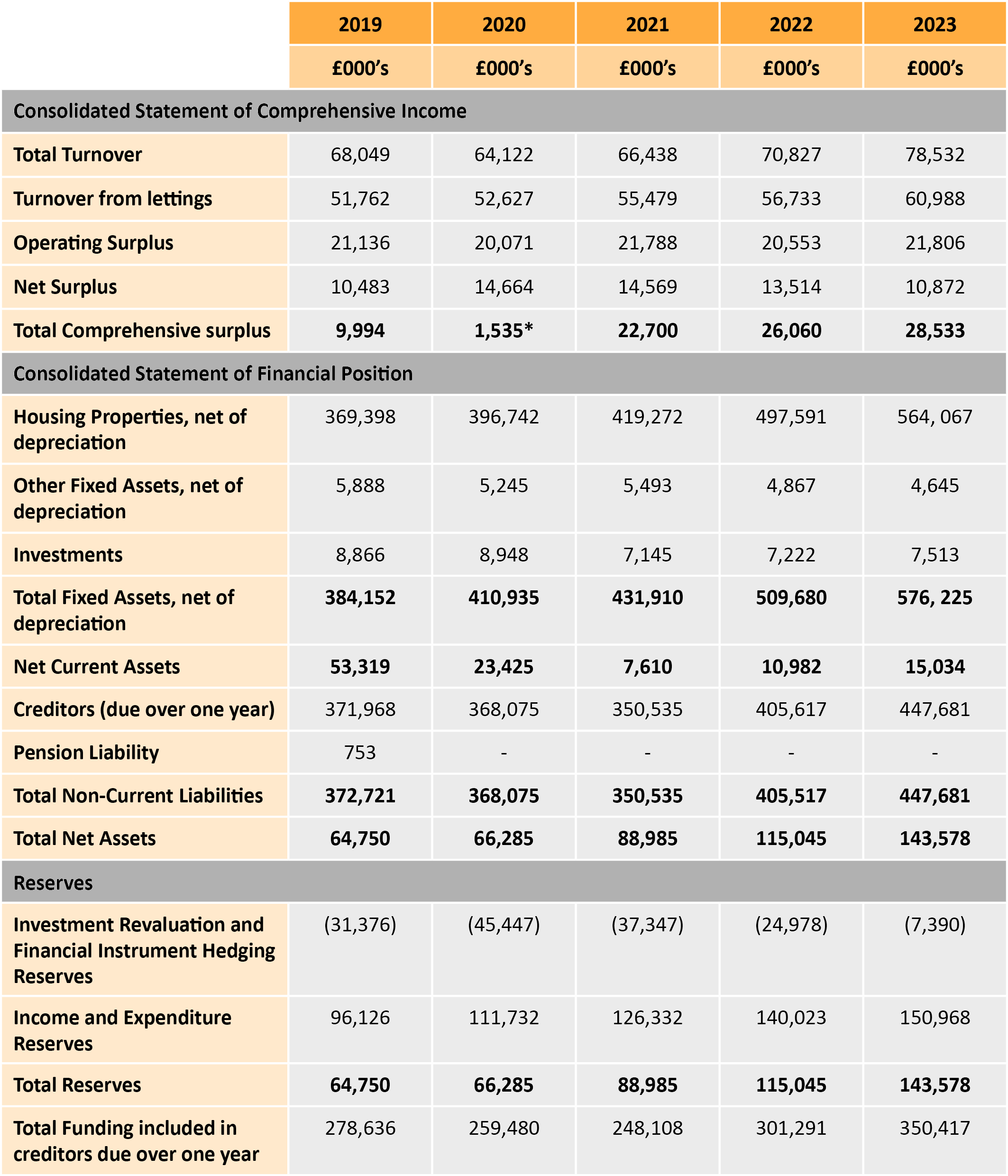
* £14m movement for financial instruments
Over the last five years, operating surpluses have been consistently over £20m. This represents a strong operating performance within a backdrop of economic and political uncertainty. Fundamental to this has been the delivery of our core social housing lettings activities which have maintained a strong performance, even though over 90% of our properties have genuinely low-cost social rents.
Long-term liabilities are detailed in the financial statements and reflect government grants, pension liabilities and the market value of financial instruments. The pension liability relates to our Local Government Pension Scheme, which has been closed to new members since 2003. While we are not in a deficit position, the inability to recoup any residual surplus once the scheme is finished means we cannot legally recognise the positive year-end position.
The sections below provide a deeper analysis of the key financial elements of settle’s business:
Turnover and surplus

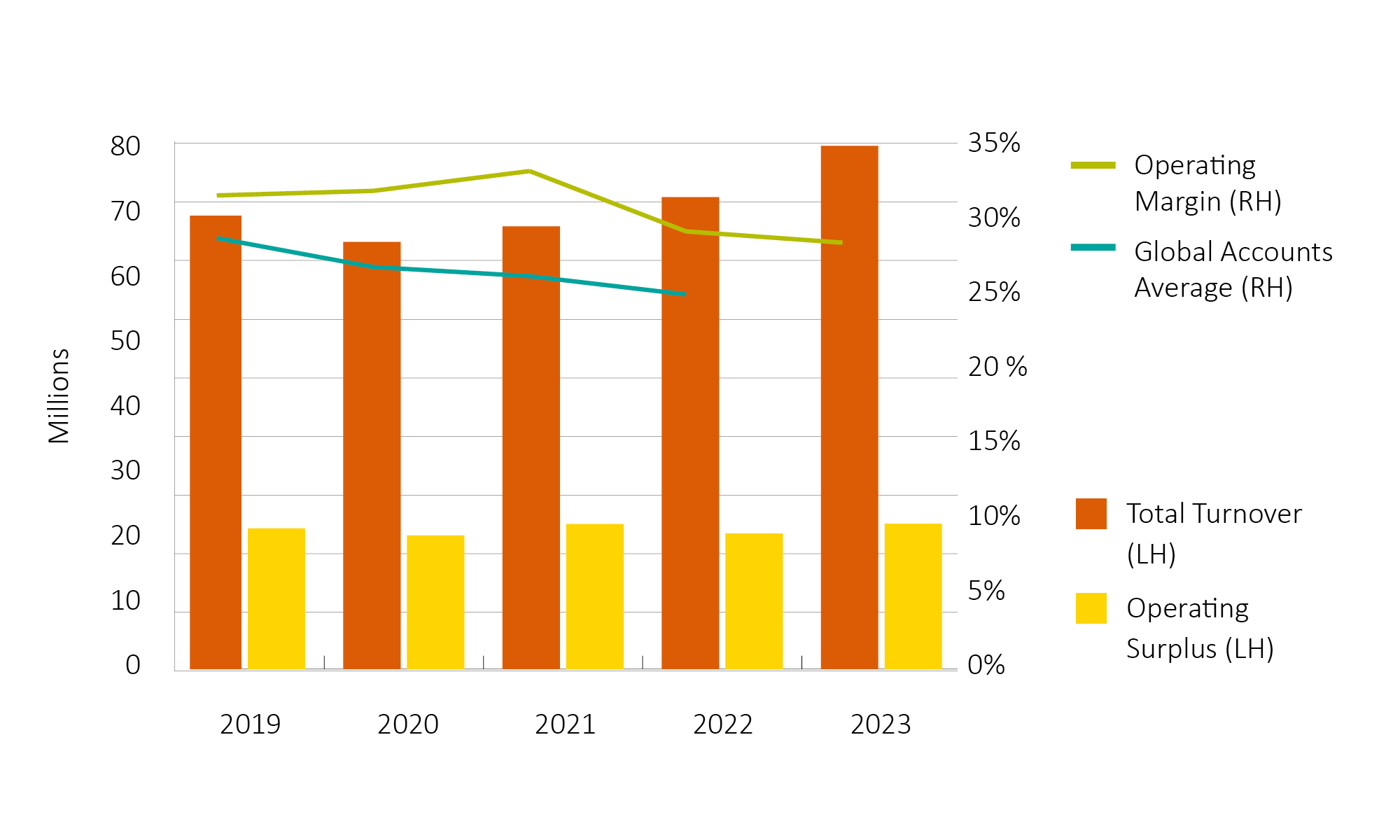
Turnover has remained strong with variances in earlier years largely driven by the timings of sales completions and varying levels of market sale.
Whilst the operating margin has remained healthy throughout the period and consistently above the sector’s global average, at 28% it has fallen below the budgeted position of 30%. This is the second year, where in agreement with our Board we have dipped below the targeted level of 30% as a result of a combination of various factors. During the past year this included increased spend on repairs due to higher costs and demand, increased investment in the quality of neighbourhoods, particularly to support grounds maintenance and cleaning of communal areas, and additional spend to proactively resolve damp and mould issues.
Turnover breakdown

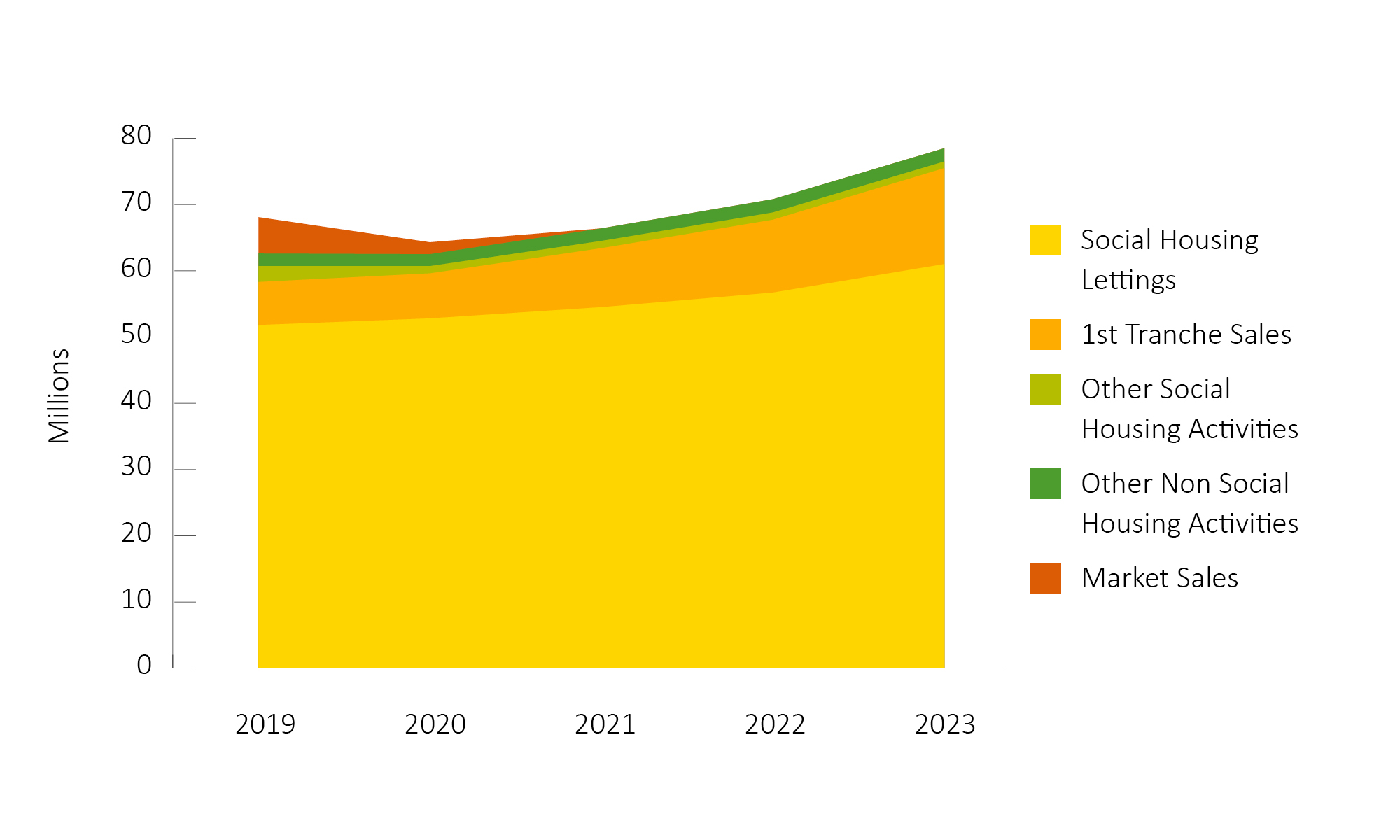
80% of our turnover in 2023 relates to social housing lettings, reflecting the continued commitment we have to the provision of truly affordable rented properties.
Our conscious decision to move to a development strategy that focuses on affordable housing rather than market sale can be clearly seen from looking over the past 5-year performance. We have focussed our attention on delivering much-needed affordable housing which provides reliable income streams.
Assets and debt

During the year we have completed additional borrowing, which will allow us to continue our commitments to increase the supply of affordable homes in the areas in which we work, and to invest in existing homes and neighbourhoods that are great places to live in.

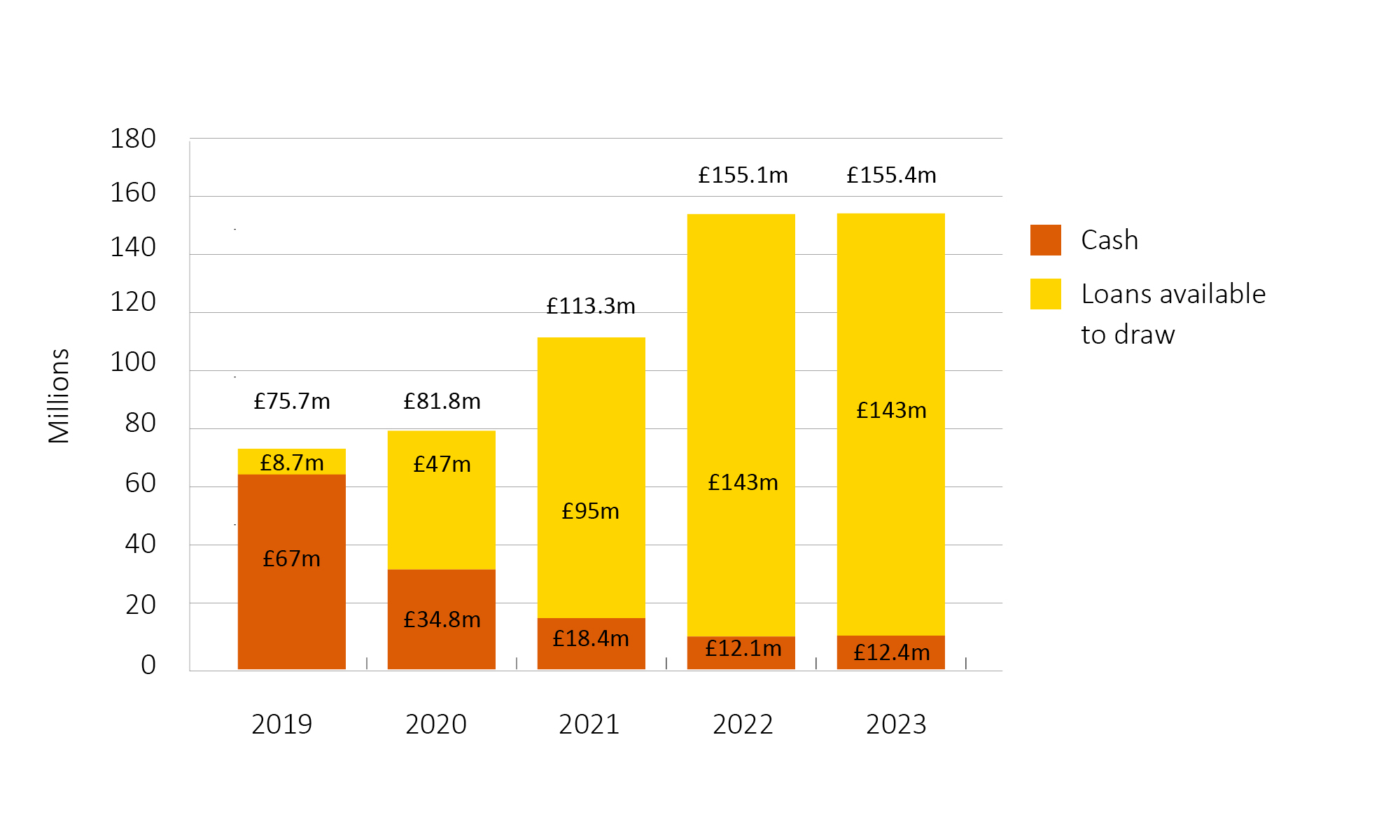
Liquidity
settle’s treasury strategy includes strict targets to ensure that sufficient liquidity is in place to fund at least 18 months of future commitments. We continually review our position to ensure sufficient funding is available to achieve our development strategy.
As at 31 March 2023, our overall liquidity headroom was £155.4m, equating to 25 months of committed development spend against our policy target of a minimum of 18 months net development spend.
Drawn debt breakdown
settle currently has £356.2m of drawn debt, split between bank loans and bonds. The long-term nature of our debt portfolio ensures there is limited refinancing risk in the short to medium term.
86% of our portfolio is currently fixed by either stand-alone derivatives or fixed rate bonds. This represents a comfortable mixture of interest rate management and flexibility within the debt to take advantage of potential fundraising opportunities.
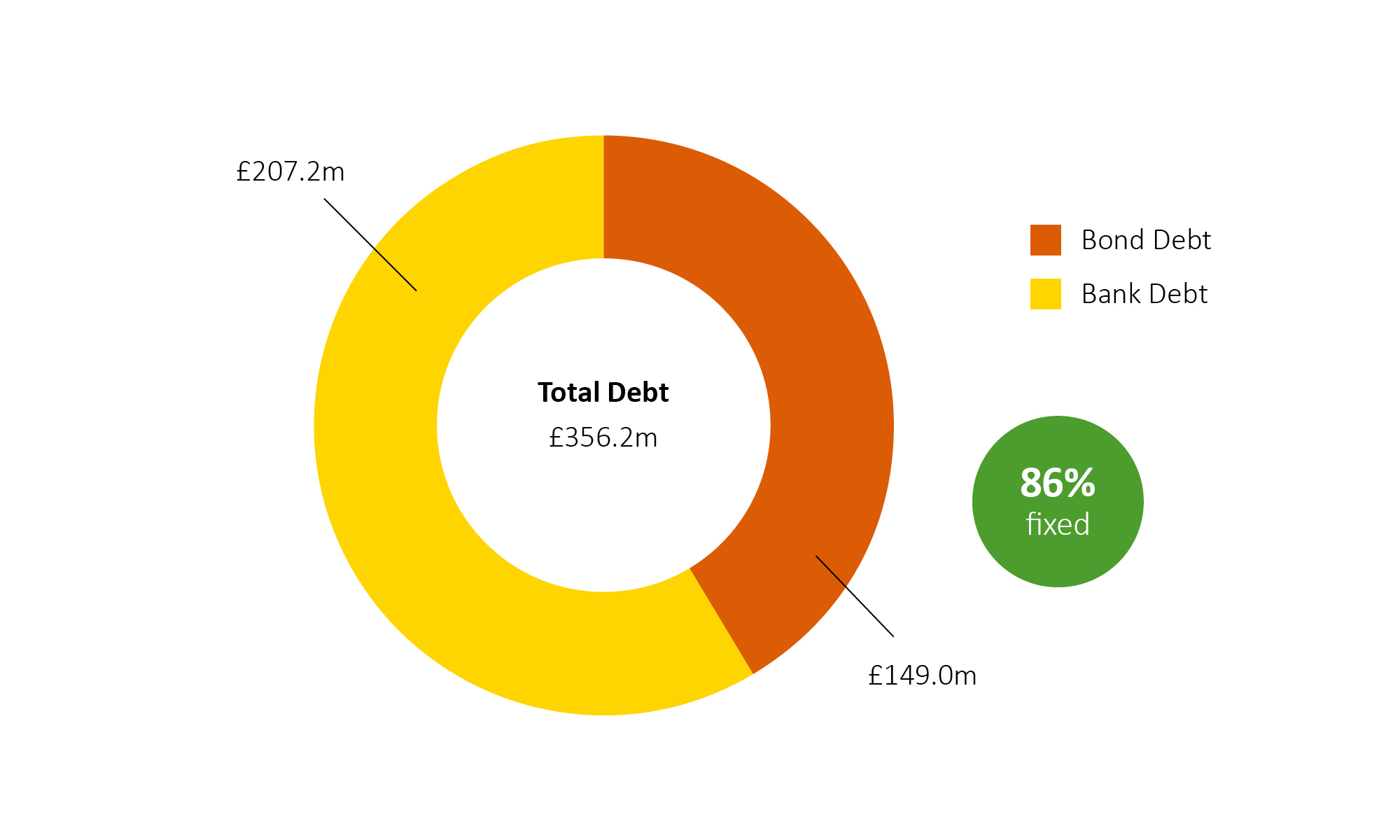
Operating Review
Investment in existing assets
As our financial review demonstrated, settle is a business that is fundamentally focussed on affordable housing. Provision of genuinely affordable rented homes remains the core component of our business.
As our corporate strategy sets out, delivering good services is of huge importance to us and this means that we continue to invest in our existing stock.
An important aspect of this is through planned investment. We continued to invest in resident’s homes and spent as planned, £14m updating homes in 2022/23, increased from £8.3m in 2021/22 and around £4m in 2020/21.
We finished the year on track replacing kitchens, bathrooms, windows and front doors and heating systems. We installed 308 bathrooms, 108 heating systems, 917 windows, 675 doors and 40 new roofs.
Our long-term financial plan is aligned to the results of our stock condition surveys. These are carried out over a 5-year cycle so that we continue to have a robust understanding of the performance of our asset base, together with clarity on where future investment will need to be made to our stock. This allows us to forward plan our asset management work, which in turn can drive procurement efficiencies.
During the past year, we have also progressed work on the new settle home standard, through which we aim to set out to customers what our aims and ambitions are for housing quality standards in the coming years. We look forward to completing this in consultation with residents this year.
We continued to invest in resident's homes and spent as planned, £14m updating homes in 2022/23.
Service delivery
In 2022/23 we completed all emergency repairs within target throughout the year. We completed routine repairs within an average of 28 days. We started the year with a target of completing routine repairs within an average of 15 days but did not meet this due to a combination of external factors impacting performance.
External pressures surrounding the supply chain, resources in contracting and materials has led to some delays in the service with demand for support around damp, mould and condensation rising rapidly in the winter of 2022/23 following the tragic events widely reported at Rochdale Boroughwide Housing.
The volume of repairs we were asked to complete during 2022/23 (21,366) decreased slightly in comparison to the number requested in 2021/22 (21,842, a 2.1% decrease). However, the repairs raised are larger in scope and require more resource to complete. This is because they are predominantly linked to damp, mould and condensation which has impacted widely across the housing sector.
The increase in major works requests impacted resources and the time taken to complete work. This impact was realised in the average days to complete routine repairs at 28 calendar days in 2022/23 compared with 24 in 2021/22.
Throughout the year we have proactively encouraged residents to report any instances of damp or mould to us, including through our website and updates sent to residents. We are committed to making sure no resident lives with damp or mould in their home. Working with the Board, we will continue to ensure systems and processes are in place to support residents and tackle the issue.
Despite the combination of challenges, overall customer satisfaction with repairs service for the year was 75%. Satisfaction peaked at 89% in February 2023. Ensuring residents are consistently satisfied is important to us and we recognise the need to reduce wait times and ensure we improve our efficiency when we follow up if repairs are more complicated.
During the year we have made changes to the property team management and staff resources to ensure we can better respond to the external operating environment. A review of our operating model is planned during 2023/24 to ensure further improvement in the service.
The following sections outline the funding we have received through the Social Housing Decarbonisation Fund, which we will use to make energy-efficiency improvements to settle properties, along with improvements through our wider planned investment programme. These programmes will improve the thermal efficiency of homes, making them more comfortable for residents to live in and mitigating the impact of resource that we have needed to allocate to larger scale repairs linked to condensation, damp and mould in properties.
Voids performance in terms of turnaround times ended the year at 54 days for major voids (target 38 days) and 23 days for standard voids (target 14 days), both measured from possession to relet of tenancy. An increased number of homes have been returned requiring garden and home clearances, with the costs and scale of works involved causing delays. The period of measure combines the repair work required to bring the property to a settle Void Standard with the lettings and offer period through to commencement of a new tenancy. The review we have planned of our operating model will also lead to improved overall void turnaround times by the end of the year 2023/24.
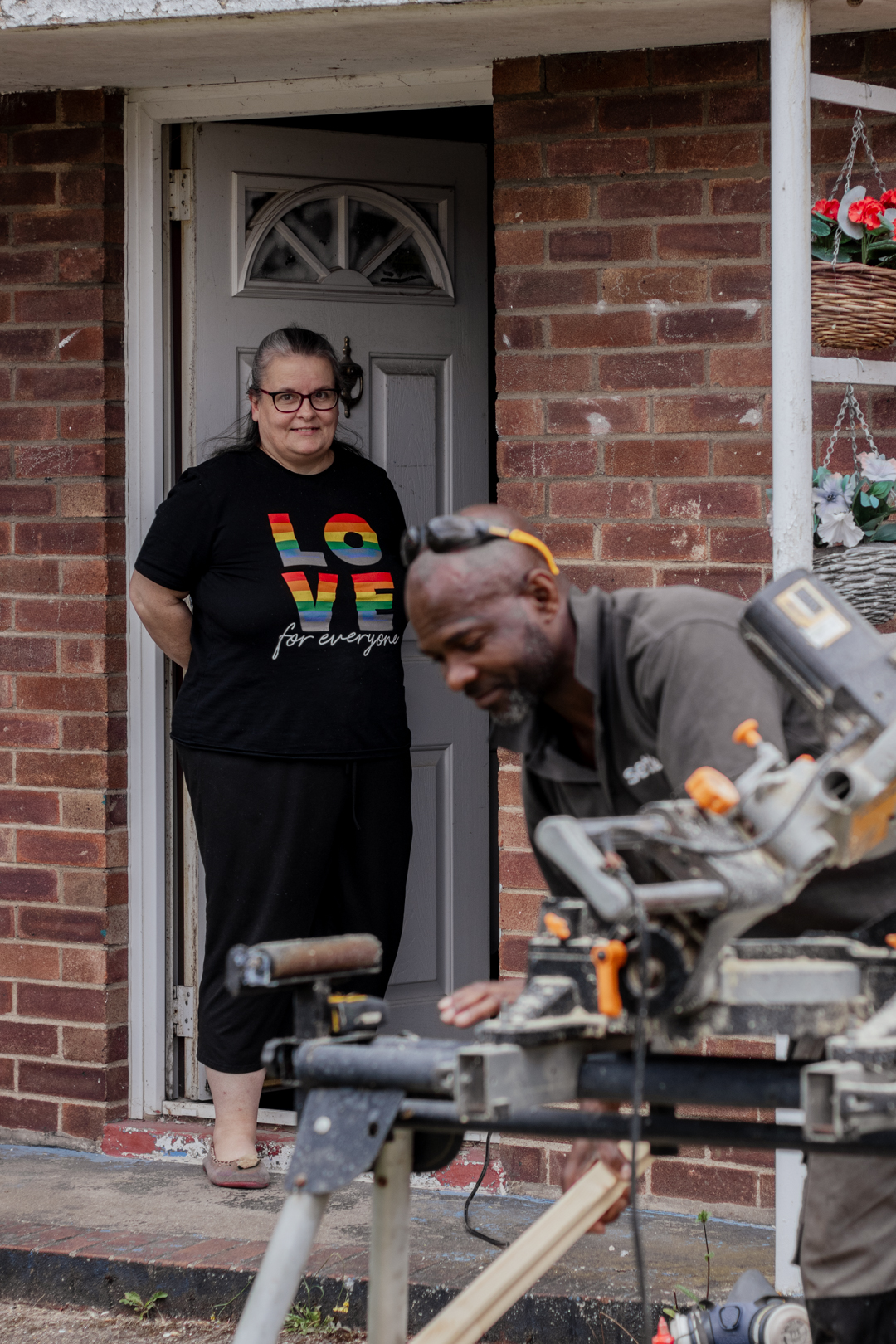
Development and sales
We delivered 278 new homes (62 social rent, 122 affordable rent, and 94 shared ownership) and one commercial unit in 2022/23, , increased from a total of 182 homes delivered in 2021/22. The 278 new homes included 62 properties developed in 2021/22 where customers were able to move in during 2022/23.
We continue to see a high demand for our shared ownership product as a means for people to access home ownership in a market where they are priced out of purchasing on the open market. This is demonstrated through average void sales times of 44 days (against a target of less than 52) and over 40% average first tranche sales. This demand continues to help cross-subsidise the development of affordable low-cost rented properties as well.
We remain committed to increasing the supply of affordable homes in the areas in which we work, doing so in a financially responsible way that continues our focus on investing in quality homes and neighbourhoods. As of 31 March 2023, we are contractually committed to a further 909 homes and will be building these in future years. 90% of these homes will be affordable, with our target being to complete 233 new homes during 2023/24.
A place where colleagues love to work
We are proud of the way in which colleagues have continued to support our customers and each other. We have made great strides in progressing our people strategy that seeks to ensure that settle is seen as a place where colleagues love to work. In particular, we have:
- Supported colleagues through the cost of living crisis, both financially and through wellbeing initiatives.
- Established use of our Peakon survey tool, enabling regular pulse feedback and annual survey results which show that our colleagues are engaged at settle and think settle is a great place to work.
- Focused on performance management, resulting in improved service delivery as demonstrated through stronger trust and effort scores from our residents.
- Introduced an equality, diversity and inclusion strategy which is supported by our value everyone colleague group, working to ensure everyone feels valued and included in the organisation.
- Put in place a clear understanding of our talent and succession plans, along with developing and supporting our aspiring management.
- Continued our focus on professionalism, working closely with the Chartered Institute of Housing (CIH) on this. We are ahead of the game in relation to ethics, conduct and behaviours, with several colleagues already signed up to do their CIH qualification.
- Worked with our colleague groups to continue supporting our culture and colleague wellbeing initiatives. This includes our wellbeing champions, value everyone group, colleague forum, mental health first aiders and innovation forum.
- Continued to find ways to automate and have improved our data and insight on colleagues through a new HR database, performance management system and engagement platform.
An environmentally sustainable business
Creating sustainable homes, neighbourhoods and a sustainable business are fundamental to delivering our purpose.During the year, the Board agreed our updated sustainability plan, focussed on three key areas:
- Homes and places – with the overarching objective to reach Net Zero Carbon at the earliest opportunity;
- People and skills – ensuring we have the skills, influence and collaboration with partners in place to deliver our commitments; and
- Operations and supply chain – ensuring that our supply chain is committed to Net Zero Carbon.
To achieve our goals, we will include sustainability in all aspects of our work.
During the year, we continued to build on our sustainability partnership, ‘Greener Herts’, with Hertfordshire-based housing associations B3 Living and Watford Community Housing, being joined during the year by Dacorum Borough Council. The consortium made a collective bid to the Social Housing Decarbonisation Fund Wave 2.1 and we were delighted to hear at the end of March that this was successful. The funding secured will see 1,500 homes across all four organisations benefit from energy-efficiency improvements worth more than £40m. Works will include loft insulation, external wall insulation, draught proofing, installation of PV panels and low-energy lighting.
The funding secured by the consortium reflects a combined pledge of £25m from B3Living, Dacorum Borough Council, settle and Watford Community Housing, plus an additional £14m provided by the Social Housing Decarbonisation Fund. We have secured £5m of this funding to invest in 677 settle properties during the next two years, moving them to EPC C.
Our ongoing planned investment programme will deliver additional energy efficiency improvements to other properties, for example through new roofs and windows.
SHIFT accreditation
During the year we also undertook our second SHIFT (Sustainable Homes Index For Tomorrow) accreditation and were pleased to again be awarded Silver. The analysis also identified where we could continue to progress, and we now have a clear plan in place to achieve SHIFT Gold status by 2027.
More information on our approach to environmental sustainability is provided in the ESG section of this report.
Social Purpose
Social purpose remains at the heart of settle. Through our giving something back approach, colleagues spent over 1,000 hours combined volunteering their time across a range of activities from garden clearance and litter picking to helping at food banks.
As part of our giving something back approach, we also completed action weeks on three of our neighbourhoods where we focused on improving estate standards. Local councillors and residents also joined us on these visits to support the work we were doing. settle colleagues contributed a total of 1,035 hours towards this work.
As we work through the final year of our 2019-24 strategy, we will continue our focus on delivering our social purpose and meeting the overall corporate target of 3,000 Giving Back hours delivered by the end of the plan. This will continue to include colleagues volunteering their time through Giving Back Days and an ongoing focus on neighbourhood action days as part of this.
Equality, Diversity and Inclusion
Through every part of our work at settle supporting our colleagues, customers and communities, we are committed to ensuring that all individuals have an equal opportunity to make the most of their lives. Equality, diversity and inclusion (EDI) plays a central role in supporting the delivery of our social purpose and sits at the heart of everything we do. Our culture at settle is inclusive and embraces and celebrates the differences in everyone.
During the past year, we reviewed our EDI strategy. Commitments from this are now incorporated into our people and customer strategies, with a clear EDI action plan spanning both, setting out what we aim to achieve over the next two to four years. The action plan is a ‘living’ document that can be adapted in line with the changing needs of our customers, colleagues, and partners, as well as the external environment. Additionally, we continue to fully support the importance of greater transparency and disclosure on ethnicity pay as part of a business’s environmental, social and governance (ESG) reporting. We report on ethnicity pay in the same way that organisations are required to report on gender pay, using the same calculation methodology set out by the Government Equalities Office.

The calculations of our ethnicity pay gap show our mean pay gap is -0.3 % and median pay gap is -1 per cent. This means that on average, minoritised ethnic colleagues earn a small amount more than non-minoritised ethnic colleagues.
We are clear that the promotion and awareness of diversity and inclusion at all levels of an organisation can bring many benefits such as higher performance, greater innovation, and a more positive environment for all. We continue to reflect this also in the services we provide, ensuring that these are inclusive and meet the needs of all residents.
As next steps we will continue to deliver on our EDI action plan. We are committed to nurturing employability across our communities, with a particular focus on progressing young people and women into alternative career paths. We will build on the work of our ‘value everyone’ group which looks at celebrating diversity amongst our colleagues. Additionally, we continue to provide training and development opportunities to raise awareness of diversity and inclusion related topics. Some of our focus points over the next year include:
- Embed a culture of continuous learning around EDI
- Review data to identify any bias, ensure equality and inclusivity in our processes and decision making
- Expanding our network and working with local groups
- Taking an intersectional approach to diversity and inclusion as part of our people strategy
- Progressing and retaining our talent
- Removing recruitment barriers.
Gender and Ethnicity Pay Gap
The Equality Act 2010 (Gender Pay Gap Information) Regulations 2017 require relevant UK employers with 250 or more employees to publish information on their pay gap. Although there is no legal requirement to publish an Ethnicity Pay Gap report, settle began doing this voluntarily from last year in the spirit of transparency and in order to identify any inequalities and take meaningful actions to address them.
We know that to support the delivery of our purpose will require a diverse and inclusive workforce in which a wide range of different voices are being heard at every level of our business. Part of realising this vision is our commitment to improve the recruitment and progression of women and people from black, Asian and minority ethnic backgrounds and to reduce our gender and ethnicity pay gaps. We continue to make active efforts to address the gaps that exist in our business, striving to ensure that every colleague is able to succeed at settle. settle’s combined Gender and Ethnicity Pay Gap 2022 report can be found on the website:
Our pay gap report 2022 (settlegroup.org.uk) and provides a snapshot of colleague data from 5 April 2022.